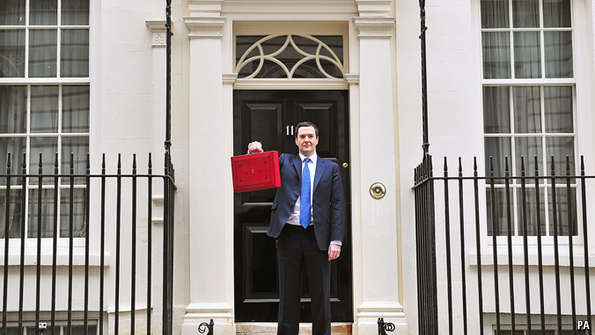After the financial crisis, the Conservative-Liberal Democrat coalition formulated a plan for the British economy and stood its ground. It was intended to see unemployment plummet and rapid growth that will put Britain ahead of other big rich countries in 2014.
The 18th of March marks the day the chancellor of the exchequer, George Osborne gives his budget speech less than two months before a general election that is more likely than not to centre around the economy. He is sure to mention the words "long-term economic plan" to assert his devotion to a fiscal surplus for Britain by 2018-19. However, the sad truth is that Mr. Osborne derived his successes from abandoning his original goals rather than sticking to them. Next week, unless his budget plans are more suitable, Britain could end up paying a heavy price.
Undoubtedly, with Mr. Osborne as chancellor, the government has done reasonable things such as reducing corporation tax, increasing the income-tax threshold and hiring Mark Carney from Canada to be the governor of the Bank of England. But it operated at its best during times when it has been least consistent in three main areas.
The first is fiscal policy. In 2010, the Tories promised to get rid of nearly all of Britain's structural deficit by the end of their term, which was estimated to be at 8.7% of GDP. Currently, the coalition is only half-way there. The amount of borrowing this year would likely amount to be 5% of GDP or £90 billion. This is £55 billion higher than originally planned. The chancellor pushed back his deadline for closing the deficit in light of two years of weak growth, due to austerity measures and a European slump. This change was needed. Following the plan would mean higher taxes or larger cuts to public spending or both. It would likely result in the economy going back into a recession and might have destroyed public services. As it is, Britain has managed with deep but steady cuts. The crime level is down and the sky has not fallen on the NHS or local government.
The second change of plans was also welcome. Previously, the coalition government followed the previous Labour government's plan of reducing capital budgets and so public investment (the easiest one to cut quickly) fell by 35%. That was a bad idea. Spending on infrastructure is crucial in ensuring long-term growth and is chronically low in Britain. Luckily, Mr. Osborne changed this starting in 2011 and once again, his change of heart was good.
The best change of course was the biggest and also the most embarrassing. Prior to becoming prime minister, David Cameron vowed to decrease the annual net migration down to the "tens of thousands". Despite this, the latest figure for net migration was at a staggering 298,000 and counting. But because immigrants are young, healthy, diligent and enterprising, they have raised growth and boosted tax revenue. A huge decline would have costed the economy because GDP has increased by 7.8% under the coalition government and GDP per person has risen by only 4.2%.
Some might say that the inconsistencies of the government are long gone or that doing the right thing is more important than saying it. But plans focus the mind and Mr. Osborne is in danger of focusing minds on the wrong matter. Britain's biggest concern is the low productivity growth, not the deficit. This has resulted in output per hour being 2% below its peak in 2008. It is probable that Mr. Osborne is aware of that and he may shift priorities later. But that might not be likely because U-turns reflect badly on the government, which means that plans have a tendency to last for too long. The best course of action is to form a plan for productivity and stick to it.

No comments:
Post a Comment